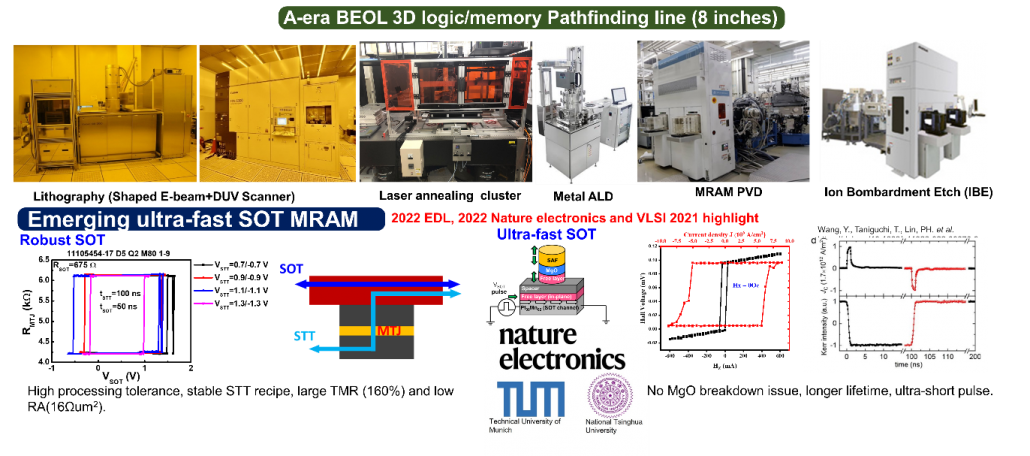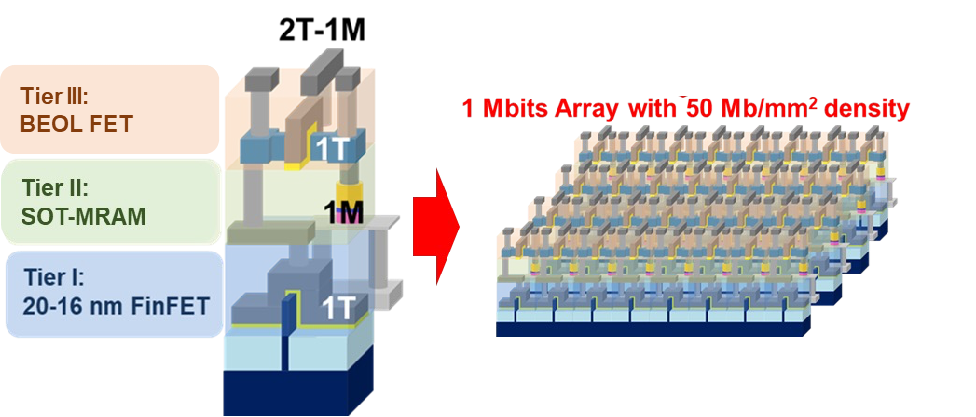Project
Emerging memory embedded monolithic 3D circuits
PI
Co-PI
This project aims to develop emerging memory-embedded monolithic 3D integration circuits (IC) for artificial intelligence and computing in memory applications, by utilizing novel high-speed memory devices (FeFET/MRAM) and an innovative BEOL low-temperature multilayered 3D circuit technology. The team has demonstrated ultra-fast (100ns) ferroelectric FinFET transistors. Additionally, we have developed perpendicular-anisotropy spin-orbit torque magnetic memory (pSOT-MRAM) devices at the same technological level as reported by Intel, which was scaled down to 80nm by standard BEOL integration with a record thermal stability of 400 degrees as published on 2021TED, 2022 EDL and 2021VLSI Highlight paper. An advanced antiferromagnetic material also has also been investigated simultaneously (2022 NATURE Electronics) and applied on spin switching in magnetic thin film
We will continue to develop high-speed and energy-efficient MRAMs by TSRI’s world-leading 3D logic/memory integration technology (>10 IEDM papers including FeFET-CIM) to demonstrate 1Mbits, 50 Mbits/mm2 memory array chips, which can envision the 2030 technology node (1.6 Gbits/mm2). This unique academic/research 8” BEOL 3D logic/memory integration line in Taiwan as a collaborative platform for the industries in interdisciplinary fields could strengthen the technological advantages of Taiwan’s semiconductor industry.
Our team has established a zero-field-operated vertical pSOT-MRAM technology with promising scalability of <150x150nm2, which approaches the achievement of 75x230nm2 by the world-leading team (TSMC/ITRI) in the SOT-MRAM memory array technology. This makes it suitable for high-density embedded memory array applications. Furthermore, this pSOT-MRAM exhibits high thermal stability (400oC) (2021VLSI Highlight paper, 2021 TED and 2022 EDL), ultra-fast SOT switching operation (5ns), and high write tolerance (1010 cycles), all of which are comparable to announcements by worldwide renowned teams like Intel. Additionally, it can be integrated with newly developed high-speed antiferromagnetic materials (published in 2022 NATURE Electronics) for zero-field operated power-saving MRAM.

Through atomic microstructure (Hf and Zr) proportion adjustment and optimization of the gate metal, we demonstrated ultra-fast (100ns) ferroelectric finFET transistors (Fraunhofer IPMS-CNT demonstrated 300ns at the 2019 IEDM). Additionally, we also developed 10nm node ferroelectric transistors with cutting-edge scaling capabilities, featuring MLC (2bits) and low power consumption of 25pJ. These transistors have been applied in a 128kbit memory array (7 Mb/mm2) chips.


